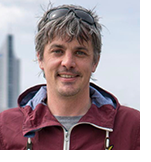 Jonathan Smallwood
Jonathan Smallwood
1975-2025
Jonathan Mark Smallwood was born on 13 October 1975 in Wolverhampton. He spent his childhood on the west coast of Scotland in the village of Fairlie. He was the first son of Howard Robert and Jacqueline Anne Smallwood. He died surrounded by his wife, Helga, and family on 24 October 2025 in West Kilbride, Scotland.
Jonny attended Largs Academy and then Strathclyde University where he studied Psychology and earned his BA (1996) and PhD (2002), under the guidance of Dr Marc Obonswain. After his undergraduate degree, he realised that while Psychology had provided detailed theories of vision, attention, memory, and language, it had little to say about internal mental states – for example, how our thoughts drift depending on mood, context and intention. His PhD, completed in 2002, focused on what he called “task-unrelated thought,” and pioneered the scientific study of mind-wandering and spontaneous thought.
From 2002-2004 Jonny was a Lecturer at Glasgow Caledonian University before traveling to Vancouver to work with Professor Jonathan Schooler as a post-doctoral researcher at the University of British Columbia (2004–2006). From 2006 to 2008 he was a lecturer in Psychology at the University of Aberdeen, after which he returned to North America to work with Professor Schooler as an assistant project scientist at the University of California, Santa Barbara. From 2011 to 2013 he was a senior researcher at the Max Planck Institute for Human Cognitive and Brain Sciences in the Department of Social Neuroscience in Leipzig, Germany. In August 2013 he joined the Psychology department at the University of York and in August 2018, he was promoted to Professor. From July 2020 until his death, he held a Professorship at Queen's University in Kingston, Ontario, where he ran the THinC Lab.
His fascination with the mind, the brain, and how they work meant that he would happily stay up all night, in any part of the world, discussing the processes involved in thought, and always wanting to reach a better understanding by bouncing around ideas. For Jonny, scientific inspiration came not just from observations and experiments, but from anywhere and everywhere, from music to cricket to football to archaeology and everything in between. Jonny’s work showed that the richness of our inner experience is grounded in the brain’s activity.
Amongst his proudest achievements were the guidance, support, and mentoring he gave to the many people he trained and collaborated with around the world, the 251 papers he published, and the unique perspectives he brought to his work, which form his legacy in the world of science. In 2006, he published his most seminal work, The Restless Mind (Psychological Bulletin), which set the foundation for the myriad of research in spontaneous thought. Until his death, and continuing through his students and collaborators, Jonny’s contributions made remarkable progress in developing sophisticated methods to capture the dynamics of thought, map them onto large-scale patterns of brain activity, and together, try to understand how these processes unfold across various contexts and environments. Since 2019, he has been ranked in the top 1% of cited publications in the fields of Neuroscience and Psychology.
Jonathan’s companion in life and support throughout his career and travels was his beloved wife Helga. Together they travelled the world making friends, drinking margaritas and taking wonderful photographs. In his leisure time, Jonny enjoyed making music, which he published on Spotify, Apple Music, and SoundCloud as Natural Philosophers With Attitude (NpWA).
Jonathan will be sadly missed by his colleagues and friends, and his wife and family including his brother Luke and sister Danielle and his 4 nephews.
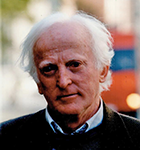 William Marshall
William Marshall
1935-2024
The Queen’s community is remembering William Marshall, Professor Emeritus of Psychology and Psychiatry, who died December 19, 2024 at the age of 90.
Bill had a long career in helping others. After graduating from the University of Western Australia, he worked at the Maudsley and Bethlem Royal Hospitals, London UK, before arriving at Queen’s University, Psychology, 1969 (in future, Professor Emeritus of Psychology and Psychiatry). Bill was a pioneer in setting up assessment and treatment programs for sexual offenders. He became an international authority advising correctional institutions in North America, Europe and Australasia. In 1993, Bill setup Rockwood Psychological Services which provided treatment and research for different types of offenders, including, sex offenders, mentally disordered offenders as well as juvenile offenders in various settings.
Bill earned many honours in recognition for his commitment to research and development of effective therapeutic programs. In 1999, Bill received the Santiago Grisolia Prize for Worldwide Contributions to the Reduction of Violence, Queen Sofia Centre, Valencia, Spain. In 2000, he became a Lifetime Fellow of the Royal Society of Canada for his contributions to science. In 2003, he received the Pope John Paul Medal as an Expert Consultant to the Academia Pro Vita, Vatican. In 2006, Bill was invested as an Officer of the Order of Canada for his international contributions in harm reduction.
In his personal life, Bill was a voracious reader, everything from philosophy to science, from literature to nature. He was a lover of birds and all nature’s creatures. He loved to hike, bike and garden; he enjoyed puzzles, games and red wine. He had been a long-distance (marathon) runner and former motor bike team driver.
A private family gathering was held to honour Bill in the spring of 2025.
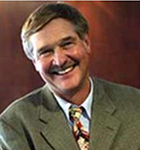 Ray Peters
Ray Peters
1942-2024
The Queen’s community is remembering Ray Peters. Professor Emeritus on the Department of Psychology, who died Feb. 15 at the age of 81.
Dr. Peters arrived at Queen’s after receiving his PhD in 1969 from the University of Waterloo, following a master’s at the same school, and completing his undergraduate studies at Dartmouth College.
Involved in the field of child development and children's mental health research for more than 35 years, he was an internationally-recognized expert on the promotion of children’s well-being and the prevention of children’s mental health problems.
Over the course of his career at Queen’s, he supervised 32 graduate student theses and dissertations and 45 undergraduate honours theses. Dr. Peters was known for being committed to ensuring that the research he conducts was translated into practice, programs, and policies.
As Research Director for the Better Beginnings, Better Futures Project, a program designed to prevent young children in low-income neighborhoods from experiencing poor developmental outcomes, Dr. Peters headed a multidisciplinary group of universities, and local research teams. The focus of the research is evaluating community-based programs which influence the development of young children and their families.
During his career, Dr. Peters also served as a Visiting Scientist at the Mental Health Division of the World Health Organization in Geneva, and the Social Learning Center in Eugene, OR. He was instrumental in establishing the annual International Conference of Behavioural Science at the Banff Centre, was a member of the executive committee, and chaired the March 2003 meetings on Effective Progress for Early Childhood Development.
He was also a member of the Expert Advisory Committee for the Canadian National Longitudinal Survey of Children and Youth, and a member of the Directing Counsel for the Health Canada Centre of Excellence for Early Childhood Development.
A service was held at 1:00pm on Saturday, April 27, 2024 at Chalmers United Church, followed by a Celebration of Life at Fort Henry's Great Hall at 3:00pm.
Dr. Peters’ family has established The Ray DeVere Peters Award at Queen's University, to commemorate his legacy and support future graduate students whose research is in the field of early childhood development. Contributions to support the fund can be made at the webpage.
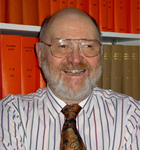 Douglas J.K. Mewhort
Douglas J.K. Mewhort
1942-2019
Beloved husband, father and professor, Doug passed away in Kingston on Thursday, February 28.
Doug was the only son of Daniel and Robena Mewhort (née Kerr). Growing up in Toronto, he began to play French Horn at North Toronto Collegiate. He received his A.R.C.T. in 1960 and played professionally in Toronto and at the Stratford Festival, and later with the Kingston Symphony Orchestra.
Although he never abandoned the horn, he was lured from his first vocation by Psychology, which he claimed had "all the most interesting problems". He studied at the University of Toronto (B.A. Hon, 1964) and the University of Waterloo (M.A., 1965; PhD. 1968). Doug joined the Psychology Department of Queen's University in 1968 and was still active there as Professor Emeritus at the time of his passing.
Doug published extensively in the fields of Cognitive Psychology, Statistics, and Computational Modeling. He fought for Queen's to invest in first-class computing resources. He also contributed generously to his profession at the national and international levels. His academic honours included Fellow of The Canadian Psychological Association, Fellow of the American Psychological Association, Fellow of the Canadian Society for Brain, Behaviour & Cognitive Science (2017), and Fellow of the Psychonomic Society.
He took two negotiated leaves from Queen's, the first at the Center for Visual Science University of Rochester in 1971-72 and the second at the Zentrum für interdisziplinäre Forschung, Universität Bielefeld, Germany in 1984-85.
He has served on the Board of the Canadian Psychological Association (Sept 2015-present), on the Board of the High-Performance Virtual Laboratory (2003 – 2014, now called the Centre for Advanced Computing). He has served as President and a member of the Executive of the Canadian Society for Brain, Behaviour, & Cognitive Science. He also has served as Editor of the Canadian Journal of Experimental Psychology (2009 – 2013), Associate Editor of Psychologische Forschung/Psychological Research 1988-2002, and Consulting Editor of Journal of Experimental Psychology: Human Perception & Performance.
Doug had published more than 100 papers in refereed journals in Psychology and edited two books on High Performance Computing. Over his career, he had supervised 21 Masters and 17 Ph.D theses. He was an elected Fellow of both the Canadian Psychological Association and the American Psychological Association.
Less than a week before his final illness, Doug learned that he had won the 2019 Donald O. Hebb Distinguished Contribution Award, a lifetime achievement award given by CSBBCS. It was the academic honour he most cherished.
Doug's best thinking occurred whilst debating with colleagues and students. He cultivated his reputation for "eating undergraduates for lunch", but was never happier than when watching students focus and grow. He influenced scores of undergraduates, and he counted the many graduate students he mentored as friends.
A gentleman of the old school, Doug believed in wearing a suit and tie and preferred to write with a good fountain pen. He loved to relax by a warm fire, a cat in his lap and a glass of fine scotch in his hand, listening to Mozart while he read. Books which survived his discerning judgment were inevitably handed on to their next reader with a considered, "you might be interested in this". Warm weather drew him to the golf course, where, whatever his score, he relished the comradery on the links and at the nineteenth hole. He had a ready smile and an infectious laugh. Above all else, he loved his family.
Doug Mewhort Website PDF (PDF, 2.2 MB)
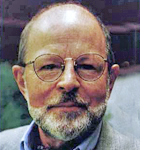 Gerald J.S. Wilde
Gerald J.S. Wilde
1933-2019
Gerald J.S. Wilde, Emeritus Professor in the Department of Psychology at Queen’s University in Kingston, Ontario, died on 1st January 2019 in Oaxaca, Mexico at the age of 86.
Born into an academic family, Gerry grew up in the Netherlands and was 12 when the Canadian Army liberated his hometown. His war experiences were a major factor in later life. After military service as a conscript in the Dutch Army, he was admitted to his B.A., M.A., and Ph.D. degrees at the University of Amsterdam, the last in 1962. After holding academic positions at the Universities of Amsterdam, Utrecht and the City University of New York Gerry came to Queen’s in 1965. Apart from academic leaves spent in France, the Netherlands, Australia, and Switzerland, he remained at Queen’s until 1997 when he retired as Professor Emeritus.
Gerry had a wide range of intellectual interests that resulted in many publications including thirty-five book chapters, eighty journal articles, over one hundred conference papers, and fifty-eight technical reports. He was a sought-after speaker, nationally and internationally, and delivered more than one hundred and seventy colloquia, guest lectures, and conference addresses. His teaching covered the spectrum of psychometrics, personality theory, abnormal psychology, and social psychology. He was instrumental in introducing courses on human factors and ergonomics into the curriculum and supervised twenty-nine M.A. and Ph.D. dissertations as well as many undergraduate theses.
A major theme of Gerry’s research was the applicability of psychology to everyday human issues. His early research included the psychometric approach to personality assessment, consumer behaviour, psychosomatic medicine, the heritability of individual differences, behaviour modification in the addictions, and sensory deprivation. In the late 1960s a major change in his interests emerged from an invitation to become a member of a scientific committee established by the Canadian Federal Government to examine road safety. Gerry found the issues raised presented a major intellectual challenge that was to guide his future research on the ergonomics of fitting the human environment to the capabilities and limitations of human performance. This included the study of traffic behaviour and the causes of accidents, of mass communication theory and its application to the alleviation of behavioural problems of societal concern, of job satisfaction, and of the effects of alcohol upon human performance.
Central to his later work is his study of risk taking and the Risk Homeostasis Theory, which he proposed in a paper published in 1982. Originally applied to the role of human behaviour in the causation of road accidents, the theory, later extended to other aspects of human behaviour, was described in several papers and two books subsequently translated into Spanish, Russian, Portuguese, Hebrew, and Japanese. The core of the theory is the assertion that peoples’ behaviour depends on the level of risk they are prepared to tolerate. It follows that health and safety measures will only be effective if they motivate people to alter the amount of risk they are willing to incur. Thus technical improvements in vehicles, such as seat belts, will not result in reduced accidents because drivers, perceiving themselves to be safer, will increase their speed or follow other vehicles more closely.
The theory has attracted both strong supporters and unsympathetic critics. A Dutch researcher suggested that it should be renamed “Wilde’s Law of the Conservation of Misery”. Another described it as “a Freudian pseudo-scientific belief held by a Dutch-Calvinist preacher who is blazing the notion of a perverse death wish”. (Coming from a Catholic background, Gerry was particularly amused by this.) The implication that improving the design of machines and the operating environment, and increasing the skill of human operators will not be effective unless the level of risk that people will tolerate is altered has attracted particular comment. One writer described the theory as “a frontal attack on the premise that the rate and severity of accidents can be reduced by improving the design of machines and environments”. Supporters have described the work as “exemplary … a focal point of debate”, “a comprehensive theory about the psychological processes that underlie risky behaviour” and a “superlative achievement”.
While not a lover of administration, Gerry gave generously of his time in service to the Department, Faculty, University and to his profession and was a member or chair of many influential committees. He successfully chaired the committee that introduced formal ethics procedures for research in the Department of Psychology, at that time a controversial issue, and later chaired the University Major Ethics Review Committee. He was a long-serving member of the Vice-Principal’s Advisory Committee on Occupational and Environmental Health and of the University Council for the Canadian Institute for Guided Ground Transport and served on the University Senate. He contributed locally as a member of the Health Promotion Committee of the Kingston, Frontenac and Lennox and Addington District Health Council and as President of the Canadian Association for the Advancement of Netherlandic Studies.
Gerry served on many committees related to transportation in both Canada and internationally including: the Research Correlation Committee of the Roads and Transportation Association of Canada; as Chair of the French Research Group on the Scientific Evaluation of Safety Campaigns; and was still serving on the Swedish International Committee on Alcohol, Drugs and Traffic Safety at the time of his death. He contributed to the organisation of conferences and symposia for many conferences and was a member of the editorial board of several journals.
Gerry’s broad expertise led to many requests for his services as a consultant and he advised agencies, laboratories, and government departments on transportation safety in Canada, the United States, Sweden, Finland, The Netherlands, West Germany, France, Ireland, Côte d’Ivoire in West Africa, New Zealand, Brazil, Switzerland, and Australia. He gave expert testimony for issues related to traffic issues and health damage due to cigarette smoking. He consulted with government and industry on topics as varied as: the use of psychology in consumer research; the use of mass communications in the prevention of drug abuse; risk assessment and risk management in helicopter skiing; the prevention of Search and Rescue incidents; and on trucking and railway crossing safety.
As with his professional life, in his private life Gerry’s interests were broad. After his arrival in Canada, he and his family took up sailing, camping and road trips coast to coast. He loved to travel and experience different cultures and spoke seven languages fluently. He had a keen sense of humour, engaged enthusiastically with ideas and with people, loved discussion and debate, and vigorously challenged established and entrenched ideas. His intellectual vigour remained until the end of his life; the day before he died he read three Spanish newspapers and he wrote notes from his hospital bed the day he died. He was cremated in Mexico and his ashes scattered over the Sierre Madre Mountains.
Gerry will be much missed by his many friends, his sister and brother in Europe, Antoinette, his wife of thirty-five years, their children Annette and Niels, and grandchildren and great-grandchildren, Aidan, Sebastian, Shawna and Ashley, and his wife and travel companion Dawn Clarke.
A memorial service will held on Sunday, 20th January at 3pm in Sydenham Street United Church. Instead of flowers, the family has asked that donations be made to Amnesty International.
Gerald J.S. Wilde CV (PDF, 123 KB)
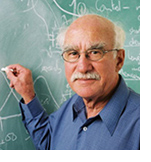 Barrie J. Frost
Barrie J. Frost
1939-2018
Barrie J. Frost, MA, PhD, LLD (h.c.), FRSC, FAAAS, FCPA, and Emeritus Professor in Psychology at Queen's University in Kingston, Ontario, died peacefully on October 4th 2018 at the age of 79 after a courageous battle with cancer. His wife Ginny and his sons, Andrew, Tim, and Hugh were with him.
Barrie was born in Nelson, New Zealand. There, he grew up roaming the steep hills that connect the mountain range in the north with the fjords and deep waters that characterize the coast of his Southern Island hometown. He completed his teacher's certificate in Christchurch, NZ, in 1959, followed by a BA in 1961, and an MA in 1964, both at the University of Canterbury, NZ. Barrie then moved to Sydney, Australia, as a lecturer at the University of Sydney before coming to Canada where he completed his PhD at Dalhousie University under the supervision of W. K. Honig in 1967. He then joined Gerald Westheimer's laboratory at the University of California in Berkeley as a postdoctoral fellow. Barrie Frost was appointed at Queen's University in 1969 and remained one of its most luminous and inspiring members for almost half a century.
Barrie spent his lifetime as a pioneer in many fields of neuroscience research. He published over 100 articles in scientific journals and lived an illustrious career that was recognized internationally through many awards and fellowships. These included the Rutherford Scholarship of the Royal Society of London, the James McKeen Cattel Award of the Association for Psychological Science, the Donald O. Hebb Distinguished Contribution Award of the Canadian Society for Brain, Behaviour and Cognitive Science, the Queen's University Prize for Excellence in Research, the NSERC Award of Excellence, and the Alexander von Humboldt Research Prize. Barrie was also a Fellow of the Royal Society of Canada, the Canadian Institute for Advanced Research, and the American Association for the Advancement of Science. He held an honorary degree from Concordia University and received the Queen's Alumni Prize for Teaching Excellence.
Barrie’s main interest was in understanding the physiology and function of visual systems. As a postdoctoral fellow, he worked on systems as diverse as eye movements in the water flea Daphnia pulex, single cell electrophysiology in the retina and tectum of amphibia, and rod-cone interactions in the human visual system.
As a young professor in the departments of Psychology and Biology, Barrie taught generations of students and worked on a diverse portfolio of questions, methods and organisms. Students remember him for his contagious enthusiasm. He was able to open their eyes to the curiosities of nature, the odd twists that evolution sometime takes, and the sophisticated interconnections and dependencies between organisms. Barrie was also a valued and respected mentor to his junior colleagues. His door was always open and he was never too busy to provide support and advice, often peppered with animated anecdotes of his own adventures.
Barrie’s research remained immensely diverse. Over his career, he worked on sensory systems in many different bird species, but also in invertebrates and mammals, including humans. He published research on depth perception in owls, optic flow computation in pigeons, and self-motion perception in humans to name just a few of his many contributions to vision science. He was also interested in tactile perception and hearing. One of his many projects involved the creation of the “tactile vocoder”, a device that translates sound into a pattern of tactile sensations that could be used by profoundly deaf people to experience sound, including spoken language.
In 2004, when Barrie turned 65, he retired from administrative and teaching duties at the university and became an emeritus professor. On the research side, however, he continued to be as active as ever. Research projects he conducted during this part of his career included studies of the migratory behaviour of the monarch butterfly, mechanisms of magnetoreception in birds, and navigation strategies in night-migrating moths.
It was only in March of this year that Barrie Frost returned from his last field trip. Together with an international group of colleagues, he had been studying the spectacular ability of the night-migrating Bogong moth to find its way, 1000 km from the hot and dry spring conditions of southeast Australia, to a small number of cool caves in the Australian Alps, where they can survive the summer. His last publication appeared in July 2018 and made the front cover of the prestigious journal Current Biology. Here, Barrie and his colleagues showed that Bogong moths can sense the Earth’s magnetic field and use it in conjunction with visual landmarks to steer migratory flight behaviour.
Barrie was not only an acclaimed scientist and educator, but he was an incredible husband, father, and grandfather. He delighted in his family and friends and enjoyed sharing his love of discovery with everyone. He was a gifted storyteller, sage advisor, and trusted friend. Those who were fortunate to know him will never forget him.
Barrie Frost Website PDF (PDF, 2.2 MB) | Barrie Frost CV (PDF, 305 KB)
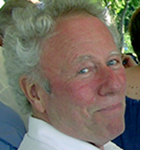 Ronald G. Weisman
Ronald G. Weisman
1937-2015
Ronald Gary (Ron) Weisman died of cancer on January 27, 2015 at 77 years of age. He passed away at home in Kingston, Ontario, Canada with his wife and son at his side. Ron was born in Detroit, Michigan, USA on September 14, 1937 to Martha and Samuel Weisman. Two years later, Ron's sister Myrna was born. Ron married Veronica Strong in Detroit, Michigan in August 1961. Six years following her death on December 21, 1981, Ron was remarried to Colleen Cairns in Kingston on June 27, 1987.
He completed his undergraduate and PhD degrees at Michigan State University. Ron was a Post-Doctoral Fellow at the University of California from 1965-66. In 1966 Ron joined the Department of Psychology at Queen's University in Kingston. Later, he obtained a cross-appointment to Biology. Ron was fond of saying that he worked at Queen's "as both man and boy".
Following 35 years of service, Ron retired from Queen's as Professor Emiratis but his prolific research career continued up to a few short months before his death. His research interests included animal learning, comparative cognition, and evolutionary biology. Ron was cofounder of the Conference on Comparative Cognition and cofounder and co-editor of its electronic journal, Comparative Cognition & Behavior Reviews.
He was an avid sailor who enjoyed vigorous debate concerning matters of science, politics, religion, and the fundamentals and art of technical writing. He read avidly and broadly. Ron was liberal in politics, atheist in religious conviction, and nondiscriminatory. He donated regularly to OXFAM Canada, NPR and the PBS. Ron's deepest losses were the deaths of Martha and Veronica. His deepest and only regret was not having more time to spend with his beloved partner, Colleen.
Ron is survived by: Colleen Cairns, wife, Kingston, ON, Myrna Messenger, sister, Sterling Heights, MI, Mitchell Weisman , eldest son, Chicago, IL, Bess Weisman, middle daughter, Ottawa, ON, Dwight Weisman, youngest son, Sterling Heights, MI, Aidan Weisman, grandson, Sterling Heights and New Baltimore, MI, Samson (Aka: Sam or SAMOO), black labrador, Kingston, ON. Ron was predeceased by: Veronica Weisman, December 21, 1981, Martha Weisman, July 1, 1957, Samuel Weisman, January 20, 1992, Max, yellow Labrador, June 30, 2003.
Ron will be remembered as a compassionate and brilliant visionary.
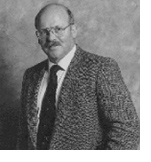 Rudy Kalin
Rudy Kalin
1938-2011
Rudy Kalin was born in Einsiedeln, Switzerland, a year before the beginning of WWII. He grew up there, but got his first opportunity to experience North America when he spent a year as a high school exchange student in New Jersey. After enjoying an eye-opening year in the States, he returned to Switzerland to finish the gymnasium run by Benedictine monks, and served his obligatory military service in the Swiss army.
A desire to study psychology and to return to the opportunities of the New World prompted him to apply to American universities. In 1958, he accepted an offer to attend Wesleyan University in Connecticut as a foreign scholar. There he had the privilege of studying under W. R. Thompson and work as his research assistant. He was awarded a B. A. degree with high honors in 1960. He also earned the Thorndike Prize in Psychology and was elected to Phi Beta Kappa and Sigma Xi.
After Wesleyan he moved to Cambridge, Mass. to commence graduate studies at Harvard University. He enrolled in the field of social psychology in the interdisciplinary department of social relations. His supervisor and mentor was David C. McClelland. He earned an M.A. at Harvard in 1962 and was awarded a Ph.D. in 1964 after completing a thesis on the effects of alcohol and social settings on fantasy.
For his first postdoctoral job he traveled west to Davis, California where he held a position as Assistant Professor from 1964 to 1967. He also met Jane McKinnis and married her in Sacramento in May of 1967. A continued stay in the United States was not possible, because as an exchange visitor he was not eligible for a green card. By 1966, W. R. Thompson had moved to Queen’s University and recruited Rudy for a job. Without ever laying eyes on Kingston, or Canada for that matter, he accepted the job offer at Queen’s and arrived in Kingston in September 1967.
Social psychology was not a big part of the department in the late 60s. Rudy taught a course in social psychology for general B.A. students. The distinction between general and honours courses would soon be eliminated through curriculum changes in the faculty of arts and science and the department of psychology. Bob Thompson would also soon recruit J. W. Berry, a Canadian social psychologist who was working in Australia. Rudy developed and introduced courses in personality and social behaviour, sex soles, and later intergroup relations. Curriculum changes at the graduate level introduced an area seminar in social psychology. Courses in social psychology became very popular among undergraduate students and a number of graduate students in clinical psychology completed theses on social psychological topics.
Rudy’s research focused, broadly speaking, on the concept of tolerance and its opposites discrimination and prejudice. With his graduate students he studied traditional sex role ideology and gender bias, particularly in the area of occupational suitability judgements. He became a collaborator with J. W. Berry on studies of tolerance and ethnic attitudes in the context of Canada’s multicultural society. Two national surveys on these topics became landmark studies for social scientists in and out of Canada. Other research relevant to multiculturalism consisted of studies on evaluative reactions to accented speech. He also investigated the dogmatic rejection of individuals with different beliefs.
During the popular headship of Andy McGhie, Rudy was able to hone his administrative skills as deputy head. He also served as acting head in 1986-1987 when Andy took a sabbatical leave after his first five year term as head. When Andy returned to the headship in the fall of 1987, he was still mourning his wife Ena’s recent death and his own health suffered. To the great regret of the department, Andy passed away suddenly in early 1988.
After Andy’s death, the dean of arts and science asked Rudy to serve as acting head for the rest of the 87-88 academic year. He was appointed head of the department as of 1 July 1988. During his headship, Rudy sought to bring consensus to the various interests in the department and he worked to make the departmental administration and procedures fair and transparent. He also reorganized support services, which had been under strain for some time. Student numbers kept growing at a higher rate than the faculty complement. In 1993 Rudy was reappointed as head for a second five year term to 1998 and in December 2000 he retired from Queen’s.
Rudy and his wife Jane had three children, all boys who graduated from Queen’s University in science and engineering fields. In his spare time Rudy was an avid sailor and participated (but rarely won) in the KYC shark fleet. When the domestic nest was empty, Rudy and Jane took up golf. In his retirement he enjoyed golf and his pride and joy were his grandchildren.
Rudy brought his considerable enthusiasm, thoroughness and organizational skills to everything he undertook, both in his professional and personal pursuits. Indeed he seemed to seek out new challenges for himself whenever he had accomplished his goals. For example, as a young faculty member he became very interested in Labrador retriever dogs, trained them expertly, and attended many field trials where he and his dogs won many awards for their performance. Likewise, when he later took up sailing he mastered sailing skills and raced his “Shark” regularly at the Kingston Yacht Club.
Colleagues and former students will remember fondly how he applied his special organizational and personal skills to the running of the Department. Under his headship he was extremely approachable, and tried very hard to be fair and equitable to everybody. His legacy on stepping down from the headship was to leave an administrative structure that ran as smoothly as a good “Swiss Watch”. As one example of his organizational skills many older members of the Department remember his ‘’Departmental Handbook” where he consolidated and listed the responsibilities of our many and diverse committees, including the important rules they were supposed to oversee. Prior to his headship this information was distributed diffusely, often in long forgotten departmental minutes, and so they were often unknown by newer members of the department and were therefore sporadically and inconsistently applied.
At the time of his death, and after nearly 11 years of retirement, Rudy again dedicated himself to a new cause, documenting the decline in “collegiality” at Queen’s over the past several years. Collegiality was, until relatively recently, the cornerstone principle of decision making at Queen’s. Rudy had researched this topic with his usual thoroughness, by sifting through the University archives and old minutes of the Senate and Board of Trustees, and even interviewing many former administrators. We all hope that this important document, which was almost finished at the time of his death, is completed by someone so that Rudy’s comprehensive analysis and historical research will reach the wider university community he so ably served.
Milton Dale Suboski
1935-2008
Milt was born in Newberry, Michigan on October 8, 1935. He passed away peacefully at home after a lengthy illness on Saturday, April 5, 2008. He received his PhD from Indiana University. He came to Canada in 1965 and spent his career in the Department of Psychology at Queen's University. Dear husband of Winnie MacInnis. Father of Viki Korhonen (John) of Port Hardy, BC., William Suboski of Ohio, Lisa Haley (John) of Ottawa, Daniel Suboski of Vancouver, BC, presently of Kandahar, Afghanistan. Grandfather of Keisha, Tannis, Robyn, Jodie and Rory Korhonen, and Alex and Joshua Haley. He is survived by brothers Larry (Lansing, Michigan), Tom (Faustoria, Michigan), Pat (Rapid City, Michigan) and sister Viki Pedroncelli (Albuquerque, NM.) and was predeceased by his brother Bill (West Unity, Ohio).
 John B. Knowles
John B. Knowles
1932-2007
John Burton Knowles, Emeritus Professor of Psychology at Queen’s, died on the 9th of August 2007 after a long battle with cancer. He is survived by his wife Molly, son Simon, and daughter Kate.
After graduating in 1953 with his B.Sc. degree from the London School of Economics, John received his Diploma in Clinical Psychology from the Institute of Psychiatry in 1958 and his Ph.D. from the University of London in 1965. From 1958 to 1965 - including a year as Visiting Research Associate at the V.A. Hospital, Palo Alto and Stanford University – John was a member of the U.K. Clinical Psychiatry Research Unit of the Medical Research Council. In 1965, he joined the Department of Psychology at Queen’s from which he retired in 1992 as a Professor Emeritus.
John was one of several colleagues from “The Maudsley” who had a strong influence on the clinical training programme at Queen’s. This led to a programme with a strong experimental and empirical approach to clinical problems. While John’s early research at Queen’s was influenced by Eysenck’s model of personality, he quickly developed an interest in the psychology and physiology of sleep and was instrumental in establishing a focus of research that is still evident at Queen’s today.
At the time that John’s interest in sleep research developed, there was great interest in the role of Rapid Eye Movement (REM) sleep and his first paper on this topic, co-authoured with George Laverty and Albert Kuechler, was on the Effects of Alcohol on REM Sleep. His most enduring contribution, however, is manifest in his leadership of a highly productive research group that included members from both the Departments of Psychology and Psychiatry. This led to a number of papers and conference presentations illuminating the chronobiology of sleep in depression and the fundamental mechanisms underlying the relationship between sleep and mood. These contributions attracted the attention of colleagues in both Europe and the United States and led to a number of invitations to speak at international institutions and conferences.
John was a gifted teacher, known for the meticulous preparation and organisation of his lectures and his ability to present complex concepts in a comprehensible manner. He was also sought after as a supervisor by both undergraduate and graduate students. He was an effective and imaginative administrator and contributed to a number of departmental, faculty, and university committees both as a member and as chair. Contributions to his profession included being a founding member of the Executive Committee at the time of the formation of the Canadian Sleep Society and one of its first Secretary / Treasurers.
John had an enduring interest in art, particular painting, and music. Many homes in Kingston have on their walls one of his paintings or the collages that he created in later life. One of John’s most remarkable and memorable qualities was his ability to cut through an argument to the heart of the matter and to master evidence which either confirmed or contradicted a thesis. He was a skilled and effective debater and will long be remembered for his quick wit, his acute sense of humour, and his companionship
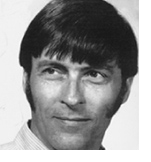 Peter Dodwell
Peter Dodwell
1930-2006
Peter was born in India, raised and educated in England, and graduated from Oxford University with degrees in Philosophy and Psychology. Scholar, writer, musician, artist, avid gardener and sportsman; he lived an active and varied life –– at times rather on the edge, but his natural charm helped him through a few awkward situations.
He came to Canada in 1958 and spent his career at Queen’s University. He also taught at London University and Harvard and was a visiting professor at various other universities in Canada, Britain, the United States, Australia, and New Zealand. Peter was a Fellow of the Royal Society of Canada and the Canadian Psychological Association of which he was president in 1985. He also held a number of prestigious research fellowships (including Guggenheim, Killam, C.D. Howe, and McLaughlin Fellowships).
He received many other academic honors, including the D.O. Hebb award for contributions to psychological science. During his career, Peter morphed from a proper young Englishman wearing jacket and tie to deliver his lectures, into a more relaxed, North American casually dressed senior professor, always looking to challenge his students and colleagues, in one way or another. In this regard, a year spent at Stanford, California in the late 1960’s proved seminal in making him a more relaxed model for his students (and family!).
Despite his busy academic life, Peter followed a number of other less formal paths. He was an active and concerned partner and parent; to the extent of marrying three times –– variety is the spice of life. He was an enthusiastic cellist and chamber musician and was quite proud of the fact that he was taught by Margaret Rowell at Berkeley Conservatory, a student of the great Rostopovich. He was a tennis player into his 70’s, a skier, and a yachtsman. He never won a Cup but once or twice gave the Canadian Shark Champion a run for his money!
Peter always had a deep concern for the meaning of life and in his later career, when married to Elizabeth, made a particular study of the idealistic and spiritual basis for human culture and creativity, culminating in a book published in 2000 titled: Brave New Mind (Oxford University Press), which swam against the strong current of Darwinian Materialism so prevalent in modern science. Peter and his wife, Elizabeth, retired to Victoria in 1993. He died peacefully on September 19, 2006.
Dictated by Peter in Victoria, B.C., on May 4, 2006, four months before his death.
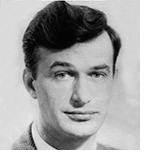 Artur Zylinski Arthur
Artur Zylinski Arthur
1927-1990
Artur Arthur, Emeritus Professor of Psychology at Queen's, died suddenly on May 3rd, 1990, only a few months after he had taken early retirement.
Artur was born in 1927 in Lithuania, and after many hazardous adventures during the Second World War (he was entitled to claim that he had survived bombing raids carried out by the air forces of almost every nation involved in that conflict) he came, via military service in the Free Polish Army in Britain, to work and study in Scotland. He secured Diplomas in both Commerce and in Business Administration, as well as an External BSc in Economics from the University of London. He moved to England where he obtained a First Class Honours degree in Psychology from London University.
He next went on to the Institute of Psychiatry of the University of London to study for the Academic Postgraduate Diploma in Abnormal Psychology. Subsequently he also gained his doctorate there.
Artur was then appointed Assistant Lecturer at the Institute, situated at the Maudsley Hospital. It was there that he met and married his wife Diane. As a teacher in the most senior clinical training program in Great Britain, Artur had the opportunity to instruct and influence a wide international range of able graduate students in the fields of both psychology and psychiatry.
As a new Ph.D., Artur left Britain to join the faculty of the University of Canterbury in Christchurch, New Zealand, where he set up a successful Training Programme in Clinical Psychology. At that time there was just a handful of clinical psychologists in New Zealand, and those students who graduated from the programme quickly rose to influential positions in universities and government service from which they were then able to establish and direct the future course of professional psychology in the antipodes. They were influenced by his rigorous and objective approach to clinical psychology, his insistence on critical thinking, and his passionate belief in the importance of psychology as a scientific discipline.
Here at Queen's, a graduate programme in clinical psychology had been initiated in 1959. On the departure of some of its founding faculty in 1965, a world-wide search was made for a new Director of this programme. Artur was called to this post and his influence came to be exercised on students and colleagues on yet a third continent. The number and attainments of our graduate students during this period of his service at Queen's testify to the great success of his efforts to educate and establish our own breed of empirical and experimental clinical psychologists in North America.
Of his other academic and scholarly activities I shall select only two for particular mention. Both of these are represented in papers published in the Psychological Bulletin. The first is entitled "Diagnostic Testing and the New Alternatives" (Arthur, 1969). This article deals with the important and practical question of how we may most reasonably and effectively use psychological decision making techniques to formulate diagnostic conclusions about abnormal behaviour. The second of these papers is entitled the "Stress of Predictable and Unpredictable Shock" (Arthur, 1986). It deals with the behavioural and pathophysiological consequences of stressful events for which the organism is either given, or is denied, forewarning. This was a significant contribution to his theory of stress as a state of anticipatory vigilance. Both of these articles have been widely read and cited, and may indeed be said to have become classics in their respective fields. They epitomize some of the themes that Artur wanted to pursue and develop in even greater depth in his retirement years.
Artur is survived by his wife Diane and his two sons, Peter and Richard. A Memorial Fund has been set up in his name, to which friends and former students are warmly invited to contribute. The A.Z. Arthur Book Prize is awarded to each of the top two students who have the highest standing in the M.A. Clinical Program in the Department of Psychology at Queen's University.
Inglis, J. (1991). Artur Zylinski Arthur (1927-1990). Canadian Psychology/Psychologie canadienne, 32(2), 183. doi:10.1037/h0084625
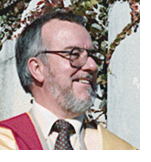 James Inglis
James Inglis
1927-1999
Professor Inglis was born in Edinburgh and educated at Leith Academy and, after service with the Royal Air Force, at Edinburgh University where he graduated with a first class honours M.A. in Psychology in 1952. He then moved to the University of London where he obtained the Postgraduate Academic Diploma in Psychology in 1953 and his Ph.D. in 1958. In 1971 the same University admitted him to the degree of D.Sc. After holding positions at the Bethlehem Royal Hospital and the Institute of Psychiatry of the University of London, Dr. Inglis came in 1959 to the Department of Psychology at Queen’s where, apart from a three year period at Temple University in Philadelphia, he remained an active member of faculty until his retirement in 1992.
Dr. Inglis, together with Dr. R.W. Payne - also from the University of London, came to Queen’s with a mandate to establish a training programme in clinical psychology. In Dr. Inglis own words: “The basic philosophy of this new programme was a clear reflection of adherence to a rigorous experimental approach to clinical problems, an approach that is still explicit in the current clinical training programme at Queen’s.” Although the programme has undergone many vicissitudes, it has been a model for many others, is currently accredited by both the Canadian and American Psychological Associations, and continues to flourish on the same solid intellectual foundation on which it was established.
Dr. Inglis’ own fields of research included: memory disorders - in which he was responsible for the development of some of the early neuropsychological testing procedures; sex differences in cerebral laterality - including learning disabilities in children; electroconvulsive therapy; and biofeedback. Among many important contributions he will be remembered for a seminal article he published in 1970 in which, on purely theoretical grounds, he argued for the advantages of bifrontal electrode placement in electroconvulsive therapy. As well as indicating the need to site electrodes to avoid impairing cognitive function, his solution drew attention to the frontal lobes as an important mediator of affective change.
A Fellow of the Canadian and American Psychological Associations, of the British Psychological Society, of the American Association for the Advancement of Science, and of the Royal Society of Medicine, Dr. Inglis gave generously of his time both to individuals and to his profession. Among many other positions that he held, he served on the Board of Directors of the Canadian Psychological Association from 1974 to 1980 holding many offices including, from 1978 to 1979, that of President. He served on the research grants committees of both the Ontario Mental Health Foundation and the Medical Research Council and was Scientific Officer of the Behavioural Science Committee of the latter body from 1974 to 1983.
No recitation of his distinguished career can give a true sense of the loss experienced by Jimmy’s family and friends. He met his wife Lily during his last year as an undergraduate at Edinburgh University when he met her at an architect student’s dance, they were married in London the following year. He will be sorely missed by her, by their daughters Jane and Katrin, and by his grandchildren Lindsay and Jamie.
A committed citizen of Kingston, Jimmy retained many distinctive Scottish characteristics. As a scientist and scholar he strove for, and appreciated, excellence. A distinguished editor of the Canadian Journal of Behavioural Science and member of many editorial boards, his precision of expression and his love for and high standards in the use of language have left many of us with the everlasting sense of an ethereal and critical presence still wielding his characteristic red pen. The floors of his house bent under the weight of his extensive collection of books which, happily, his retirement gave him more time to enjoy. For many years to come we will continue to look for him in the corner of Chez Piggy - a plaque now designates his favourite table the Inglis Nook - where we shared his warmth, his friendship, his acute sense of humour, and his enjoyment of food, drink and conversation on matters both trivial and profound.
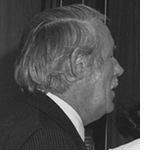 Andrew McGhie
Andrew McGhie
1926-1988
Born in Glasgow, Scotland in 1926, the son of the managing director of a construction company who had been promoted from the shop floor, Andrew received his education at John Glenn’s School, a noted private school in Glasgow. Drafted into the British Army in 1944, he was posted to a Scottish infantry regiment and took part in the invasion of Sumatra, then occupied by the Japanese, in 1945. After demobilization he went up to Glasgow University where he took a double first in Psychology and Economics. He then undertook post-graduate studies under the supervision of Thomas Freeman, a distinguished psychoanalytic psychiatrist who was editor of the British Journal of Medical Psychology.
He trained at Glasgow Royal Mental Hospital under the supervision of Freeman and John L. Hamilton, a distinguished Scottish psychiatrist. The three published an influential monograph, “Chronic Schizophrenia”, in 1958. Based on an experiment in which the three clinicians spent several hours each day over the course of several weeks with a group of 18 chronic schizophrenic patients on the ward, the monograph was influential in documenting the crucial role played by psychiatric nurses in the management of these patients. Although the monograph’s approach was generally heavily psychoanalytic, the chapters on perception, thinking and memory written by Andrew were notable for their empirical perspective, anticipating the experimental psychopathology model of mental illness which developed during the subsequent decade.
Andrew was subsequently appointed clinical psychologist at the Crighton Royal Hospital in Dumfries where he worked with R. D. Laing, then a resident in psychiatry. In 1960 Andrew was appointed Principal Psychologist at Royal DundeeLiff Hospital with an honourary appointment in the Department of Psychiatry at St Andrews University. There he developed a program of research aimed at adapting the techniques of experimental psychology to the investigation of cognitive deficits in schizophrenia.
In 1968, he was appointed Associate Professor in the Department of Psychology at Queen’s University, and served as Head of Department from 1980 to 1987.
Contributed by Stuart Lawson, Mental Health Services, Providence Continuing Care Hospital, Kingston, ON.
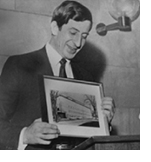 William Thompson
William Thompson
In 1948-49 the Department of Philosophy had become the Department of Philosophy and Psychology. The faculty were divided under these two headings. William Thompson was one of the Instructors for Psychology. There was, between 1949 and 1959, for the academic ranks above Lecturer, a very rapid turnover of faculty in the Department. Thompson had left and returned to Queen's in 1954 to spend two years as Lecturer in Psychology. He came at that time from McGill, where he had carried out some of the pioneering studies of the effects of early environmental restriction on later development in animals. He left in 1956 to take up a position at Wesleyan University in Connecticut. In 1966, William Robert Thompson returned once again to Queen’s, this time as Head of Department of Psychology. Born in 1924 of Canadian parents in Toulon, France, and a graduate of the Universities of Toronto (BA, 1945; MA, 1947) and Chicago (Ph.D., 1951), he had worked in many university departments of psychology in Canada, the United States, and in Australia. An authority in the fields of developmental psychology and behaviour genetics (see, for example, Fuller and Thompson, 1960; 1978), he had held a Guggenheim Memorial Fellowship in the Behavioral Sciences at Palo Alto in 1963-64. He came to Queen’s, on this occasion, just as George Humphrey had done, from Wesleyan University in Connecticut.
Inglis, J. (1982). Psychology at Queen's. In M. J. Wright & C.R. Myers (Eds.), History of academic psychology in Canada (pp. 100-115). Toronto Hogrefe (reprinted with permission of publisher).
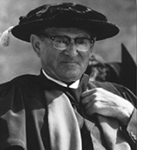 Julian Blackburn
Julian Blackburn
Julian Murray Blackburn was born in Hove, England, in 1903. An old Wykehamist, he was a graduate of both the London School of Economics (B.Sc. Econ., 1928) and of Cambridge University (Ph.D., 1933). While he was at Cambridge he had worked, under F.C. Bartlett, with the Industrial Health Research Board (1928-33). After holding a Rockefeller Fellowship at Yale University in 1933-34, he was then employed by the Medical Research Council (and also worked as a clinical psychologist at the Maudsley Hospital) over the years 1935-38. He became a Lecturer in Social Psychology at L.S.E. in 1939, where he remained until he emigrated to Canada in 1948. For one year he was an Associate Professor at McGill University, and was called to the Chair at Queen’s in 1949. While he was still at L.S.E. he had published two brief texts, Psychology and the Social Pattern (1945) and The Framework of Human Behaviour (1947). He was a man who had, when he chose, great power to charm, together with a ready wit (which was, however, not always without its own barbed edge).
In the first years of his term at Queen’s, much effort must have gone into building up the undergraduate curriculum in psychology. Just before Philosophy and Psychology were formally split apart there were seven lecture courses and three reading courses offered in psychology. A few years later there were fifteen lecture courses and three reading courses available. Perhaps because of Blackburn’s own experience in applied and clinical psychology, closer links were also being forged, at this time, between the Departments of Psychology and Psychiatry. Dr. C. Homer McCuaig, who was Professor of Psychiatry and Superintendent of the Ontario Hospital, Kingston, was then listed in the University Calendar as a member of the Department of Psychology.
He was Editor of the Canadian Journal of Psychology from 1959-1965, and served on many national and provincial committees.
By 1964-65 changes were in the air. Julian Blackburn had withdrawn as Head of the Department, and Peter Dodwell was Acting Head.
In 1960, Julian Blackburn had already been appointed, on behalf of Queen's University, as one of a group of advisers to the Board of Governors of the nascent Trent College in Peterborough; a group informally known as the ‘Midwives’ of Trent. In 1965, Blackburn resigned from Queen’s to become the first Chairman of the Department of Psychology at that new University. He was Associate Dean of the Faculty of Arts there from 1969 to 1970, becoming Emeritus Professor of Psychology in 1973. He died in September, 1974, and the next year there was established in his name the Julian Blackburn College of Part-Time Studies at Trent University.
Inglis, J. (1982). Psychology at Queen's. In M. J. Wright & C.R. Myers (Eds.), History of academic psychology in Canada (pp. 100-115). Toronto Hogrefe (reprinted with permission of publisher).
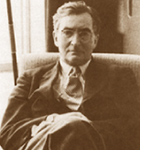 George Humphrey
George Humphrey
1889-1966
George Humphrey was born in Broughton, England in 1889, and took his degree in Greats in Oxford in 1912. He then studied psychology at Leipzig in Wundt’s laboratory as a Cassel Scholar. After that he came to Canada and spent two years as Professor of Classics at St. Francis Xavier University. He then went on to Harvard as Townsend Scholar and gained his Ph. D. there in 1920. After his doctorate he went on to work with Raymond Dodge at Wesleyan University in Middletown, Connecticut. While he was still at Wesleyan he published his first book, the Story of Man’s Mind (1923), which was a popular psychology text; its contents were described on it dust cover as, “The psychology of business, home and school, with its thousand uses and applications explained for everyone.”
Humphrey’s name first appears in the Queen’s University Calendar for 1925-26 as Charlton Professor of Philosophy in the Department of Mental and Moral Philosophy; his only colleague in that Department for the next three years being H. Reid MacCallum. Humphrey was, as later described by Bartlett (1966), “A man above normal height, neat, active, very friendly; but also on occasion, unyielding, and a good companion.” He is now portrayed in a place of honour in Humphrey Hall, the present home of the Department of Psychology at Queen’s University, as he is shown in the accompanying photograph.
When he was called to Queen’s, he had been asked by the Dean of Arts, Oscar Skelton, to build up the psychological side of the Philosophy Department (Blackburn, 1957) and this he began at once to do, with very great energy and effect.
In terms of undergraduate work, there was a sharp and dramatic change in course content just as soon as Humphrey took over. From a heavy concentration on the Greek and German philosophers, the Department changed to a broad offering of courses in psychology, as well as in philosophy.
By 1930, Humphrey and his new Associate Professor, Reginald Jackson, between them gave ten intramural courses in philosophy, of which five were actually courses in psychology.
By the year 1931-32, Jackson had left the Department, and Humphrey was running his courses with the aid of but one Lecturer, Dr. Gregory Vlastos. Nevertheless, a new course, Philosophy 98. Problems in Psychology, was that year introduced, with the following intent. “A specific problem of a minor character is taken up experimentally. A comprehensive report will be required, which will exhibit the results of the experimental work and give an account of the previous literature. The course is open for advanced students only, and by permission of the instructor.” This certainly reads as if Professor Humphrey had begun in earnest to produce psychologists under cover of his Department of Philosophy!
At the same time as George Humphrey was so radically changing the undergraduate curriculum of his Department he was, of course, also engaged in many other tasks of fundamental importance to the development of psychology in Canada.
In the early years of his appointment he had to beg or borrow laboratory space for his own investigative work wherever he could find it (how, at that time, would a Professor of Philosophy justify his need for a laboratory?).
Only the hospitality of the Department of Biology enabled him to carry out his classical work on conditioning effects using pure tones and arpeggios (Humphrey, 1927), and his studies of habituation in snails (Humphrey, 1930). It was, it will be recalled, Humphrey’s so-called discussion of the patterning of stimulus compounds as part of his influential Principles of Behavior (1943). Humphrey himself put his work on conditioning and learning together in his best book, The Nature of Learning (1933). The year before that he had, with his first wife, published a translation of Itard’s Wild Boy of Averyon (1932), to which he had also added a scholarly introduction.
In his time at Queen’s, Humphrey also wrote the chapter on “Thought” for his first edition of Boring, Langfeld and Weld’s Psychology: a factual textbook (1935). His book Directed Thinking (1948), although it was not published until he had left Canada, was written at Queen’s and in it he acknowledges the help of, “My Friends Gregory Vlastos, who critically read many of the chapters, Martyn Estall, and R.O. Earl, each of whom gave me expert advice.”
Humphrey was also active in the application of psychology to military purposes, especially personnel selection, in the Second World War (Blair, 1966). He joined with other psychologists at that time as a founder-member of the Canadian Psychological Association (Myers, 1965). He was Secretary of the Association for the first three years of its existence, and then followed E.A. Bott as its second elected President. In his spare time he wrote two novels!
In 1947, St. John’s College invited Humphrey over to Cambridge for a year as a Dominion Fellow. That same year, the University of Oxford, defying William McDougall’s (1926) sarcastic prediction, managed to create a Chair to which Humphrey was called, and thus lost to Queen’s.
Inglis, J. (1982). Psychology at Queen's. In M. J. Wright & C.R. Myers (Eds.), History of academic psychology in Canada (pp. 100-115). Toronto Hogrefe (reprinted with permission of publisher).